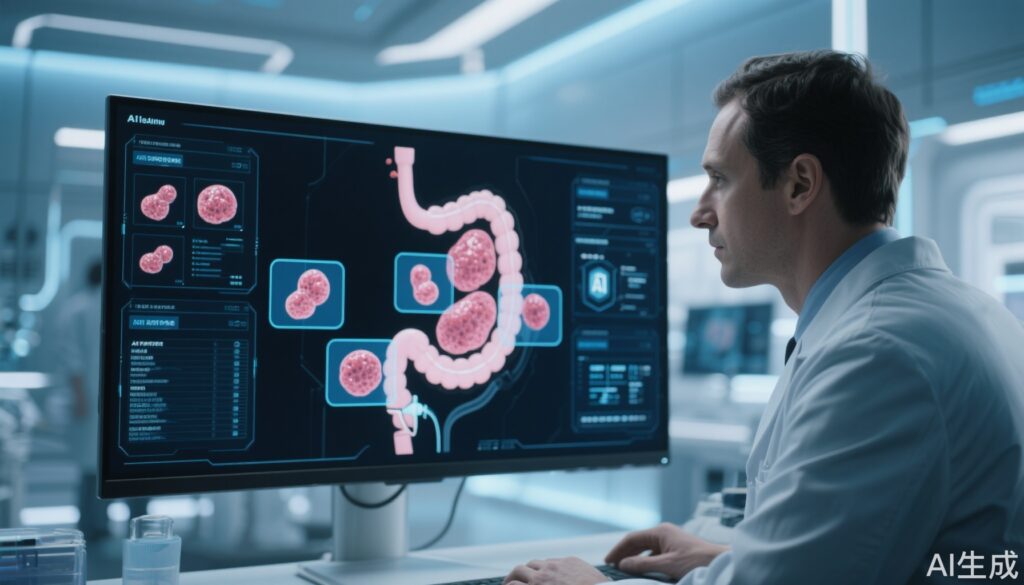Study Background and Disease Burden
Colorectal cancer is one of the leading causes of cancer-related morbidity and mortality worldwide, with adenomatous polyps being recognized precursors to malignancy. Early identification and removal of adenomas during colonoscopy significantly reduce the incidence of colorectal cancer. However, adenoma detection rates (ADRs) vary widely among endoscopists, with detection failures contributing to interval cancers. Recent advances in artificial intelligence (AI) technology promise to augment endoscopists’ ability to identify precancerous lesions and improve patient outcomes. However, the rapid and widespread adoption of AI-assisted tools has introduced concerns regarding the potential impact on physician expertise and independent diagnostic skills over time.
Study Design
A multicenter trial deployed an AI colonoscopy tool across four medical centers to support endoscopists during screening. The AI algorithm highlights adenomas by drawing bounding boxes in real-time on the video feed to assist in identification. The study was designed to evaluate two primary questions: first, whether AI assistance improves adenoma detection rates during colonoscopy; second, whether reliance on AI affects endoscopists’ independent adenoma detection capabilities when AI is not used. During the trial, each endoscopist alternated between procedures with and without AI support. Adenoma detection rates were measured during three months prior to AI implementation and again three months after consistent use of the AI system.
Key Findings
The AI-assisted colonoscopy tool successfully increased adenoma detection rates during usage compared to unaided procedures, confirming AI’s role as a valuable adjunct. However, a striking and concerning observation was made regarding endoscopists’ performance in the absence of AI following habitual use. Before AI introduction, physicians independently detected adenomas in 28% of colonoscopies. After three months of regular AI use, their unaided detection rate declined to 22%, a statistically and clinically significant reduction. This decline was interpreted as evidence of a “de-skilling” effect, where reliance on AI guidance may erode physicians’ intrinsic observational skills and vigilance.
Expert Commentary
This phenomenon mirrors similar concerns in other fields where automation may reduce practitioners’ critical skills when technology is disengaged. It is reminiscent of the challenges educators face when over-reliance on AI writing tools may impair students’ independent critical thinking. While AI promises to elevate diagnostic accuracy and patient safety, the potential for skill attrition mandates cautious and balanced integration. The study’s strengths include its real-world multicenter design and objective outcome measures. Limitations involve the relatively short observation period post-AI adoption and lack of detailed assessment of endoscopists’ experience level or cognitive engagement.
Physicians must be trained to use AI as a cognitive aid rather than a crutch. To mitigate de-skilling, continuous education campaigns, periodic skills assessments, and structured protocols encouraging active physician involvement during AI use are necessary. Furthermore, the development of AI systems that support augmented expertise rather than replacing human judgment may preserve and enhance diagnostic skills.
Future Directions and Solutions
To address the de-skilling risk, healthcare systems and technology developers should consider the following strategies:
1. Structured Training: Incorporate formal training modules emphasizing skill retention alongside AI-assisted detection.
2. Rotational AI Usage: Encourage intermittent AI use to maintain physicians’ autonomous skills.
3. Performance Feedback: Provide physicians with individualized performance data comparing AI-assisted and independent detection to reinforce self-awareness.
4. AI System Design: Develop AI tools promoting active learning and prompting physicians to engage in decision-making rather than passive reliance.
5. Longitudinal Studies: Conduct longer-term studies assessing the impact of AI on clinical skills over years, across various procedures and specialties.
Conclusion
Artificial intelligence is transforming colonoscopy by improving adenoma detection rates and holds promise to reduce colorectal cancer incidence. However, early evidence suggests that habitual use without safeguards can impair physicians’ independent diagnostic skills, posing a risk of clinical de-skilling. Balanced integration that combines AI augmentation with continuous skill maintenance and critical engagement is essential to optimize outcomes. Vigilant monitoring, education, and well-designed AI-human interfaces will be vital to harness AI’s benefits without compromising the core competencies of clinicians. This emerging evidence should guide policy makers, healthcare providers, and developers in shaping responsible AI adoption in medicine.
References
1. Budzyń, Krzysztof et al. Endoscopist deskilling risk after exposure to artificial intelligence in colonoscopy: a multicentre, observational study,The Lancet Gastroenterology & Hepatology,



